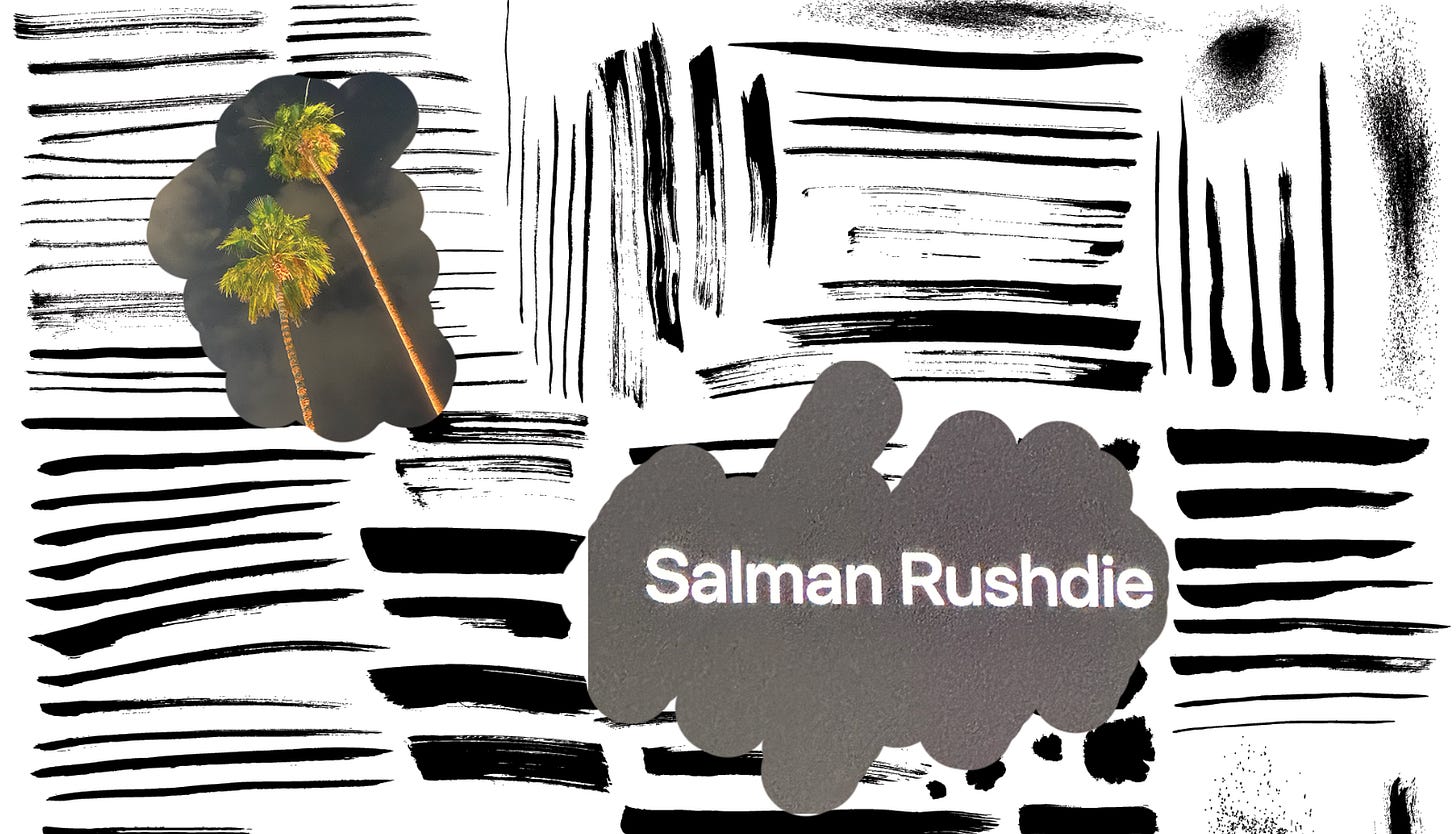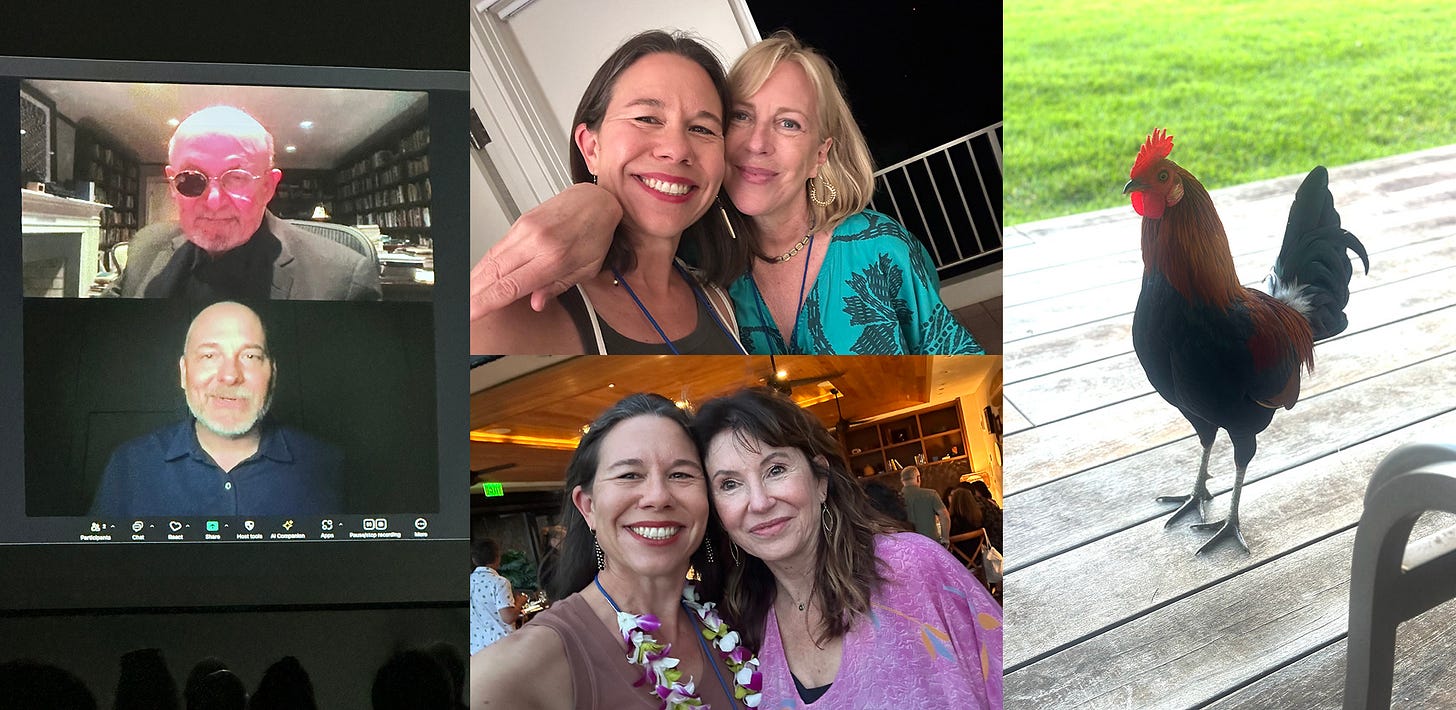Writing Is a Mess
And Other Writing Advice from Salman Rushdie (coming to you live from the Kauai Writers Conference)
I’m on the island of Kauai this morning, back at the Kauai Writers Conference for my fourth go-round. This year there are some 400+ participants, with special guest teachers like Salman Rushdie, Lauren Groff, and Molly Ringwald. Me, I’m hobnobbing with old friends, including Christina Baker Kline, Amy Ferris, and Lisa Leshne, and of course my posse of She Writes Press authors.
When you’re in the publisher/agent/editor cohort at writers conferences like these, you work hard, especially if you take one-on-ones, as I have been. But I prioritized seeing Salman Rushie teleport in from New York (I heard he would have been flown out but his security detail is too expensive these days) because I’ve loved everything he’s been saying about memoir writing in the aftermath of publishing his most recent book, Knife: Meditations After an Attempted Murder, which centers his experience of being stabbed onstage at the Chautauqua Institution in 2022.
Since most of you, dear readers, aren’t here with me this weekend (though a handful of you are—and hello), here are the three most salient takeaways I got from listening to Rushie speak:
1. Writing is a mess
This is a direct quote, specifically in reference to the fact that there’s nothing about the process of writing a book that follows a prescribed way of doing things or a specific formula. (Yes, he caveated, there are formulaic books and genres, so I will here too.) Writing is a mess, and the writer’s job is to keep writing until whatever they’re writing becomes less of a mess. This one resonates so much because writers I work with often get frustrated with themselves and the process. It’s not uncommon for new writers to long for a roadmap, or get frustrated, feeling like other, more experienced writers have the key to writing and finishing. But what Rushdie said really is the key—just keep writing and letting it unfold until things start to become less murky. There is no way to an ending but through the mess, and please don’t imagine yourself wrong or a worse writer or a more challenged writer just because it’s messy. Everyone goes through this, so stay the course.
2. Writing a book only teaches you about how to write that one book (in other words, it doesn’t get easier)
Rushdie has written 22 books, and his simple answer to the question “Does it get easier?” was no, it does not. He talked about writing his 1980 novel, Midnight's Children, and how he found the beginning of the book 150 pages into an early draft. When he realized that scene needed to be the beginning and thus moved it, he realized he had to start over. He spoke about the countless false starts he’s made to find entry points, saying entry points are “the central question,” but also something we must cast around for. We must be open to finding or discovering them when and where they show up. Writing books isn’t supposed to be easy, of course, but it does give solace to newer writers to know that writers of the caliber and experience of Rushdie still puzzle, still plough through the challenges presented them by their own work. In many ways, the takeaway here is the same from Point #1: stay the course.
3. Only write the books you have to write
At first the audience laughed because Rushdie said if you can avoid writing a book, avoid doing so. This reminded me of Mary Karr, who’s quipped that writing memoir is like punching yourself in the face, and if it’s possible for you to walk away, you should. Same idea here—only do it if you must. There are a lot of books already in the world, Rushdie said, so only write the books you have to write, but also only write the books you love. To me this simple piece of advice is a North Star. If we only write the books we love, we can let go of books that aren’t working. We stay connected to meaning and purpose, and we don’t need to justify to anyone else why we’re writing a simple truth: I love what I’m writing. I need to write it.
Yesterday, I taught a memoir session with Amy Ferris. I talked about how many students I’ve had over the years who set their books aside but can’t and don’t ever really let them go. If a story is living inside of you and wants to be told, it might take years, but it will remain in you and with you until you put it on the page. Amy talked about releasing our stories onto the page. This idea that they’re somewhat captive inside you until they’re released rings true to me. Sometimes we midwife that release; sometimes the release feels violent and torturous due to shame and fear; sometimes it just takes a fucking long time. In other words, it’s a mess, but writing is a beautiful mess that will teach you more about yourself and life and living than anything else I know.
Mahalo, friends, and a few snapshots from the island:





That is some of the best writing advice I've ever received, Brooke. Messy! Endless! And truthfully, that's what I like about it. SO much writing instruction I encounter is all way too formulaic for me to connect with. There is something organic and unexpected about writing that keeps me addicted to it, and keeps me resisting the sort of advice that would wring that messiness out of me. So glad you are ... working ... in such a lovely place. Hope you find some time to be bratty and off the clock!
I love all of this, particularly #1, although all of it speaks right to the core of writing. And it felt kind of good to know that Salman Rushdie shares one of the things I often tell my students--which is you don't always know where your beginning will show up--it could be near the end! But all of it is inspiring and beautiful. Thank you for sharing it Brooke--and how I hope to make it to this conference one of these days!